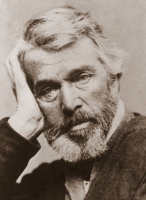| 托马斯·卡列利 | |
| | |
Thomas Carlyle (4 December 1795 – 5 February 1881) was a British historian, satirical writer, essayist, translator, philosopher, mathematician, and teacher. In his book On Heroes, Hero-Worship, and The Heroic in History (1841), he argued that the actions of the "Great Man" play a key role in history, claiming that "the history of the world is but the biography of great men". Other major works include The French Revolution: A History, 3 vols (1837) and The History of Friedrich II of Prussia, Called Frederick the Great, 6 vols (1858–65).
His 1837 history of The French Revolution was the inspiration for Charles Dickens' 1859 novel A Tale of Two Cities, and remains popular today. Carlyle's 1836 Sartor Resartus is a notable philosophical novel.
A noted polemicist, Carlyle coined the term "the dismal science" for economics, in his essay "Occasional Discourse on the Negro Question", which advocated for the reintroduction of slavery to the West Indies. He also wrote articles for the Edinburgh Encyclopaedia.
Once a Christian, Carlyle lost his faith while attending the University of Edinburgh, later adopting a form of deism.
In mathematics, he is known for the Carlyle circle, a method used in quadratic equations and for developing ruler-and-compass constructions of regular polygons.
